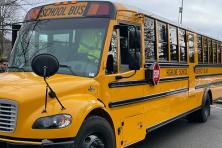Making it through a Washington State legislative session is always an exercise in perseverance. I reflected on this last year after the Legislature adjourned, and the imperative to not give up and to seize opportunities where they arise resonates even more strongly today. What happened this year? Despite massive challenges, we pushed on.
I have been working at Climate Solutions since 2019 and have been through seven legislative sessions. Some led to huge leaps in climate progress, some to incremental steps, and there were some where we fell short. This was a hard session. The Legislature was dealing with a multibillion-dollar shortfall and serious uncertainty due to threats from the federal administration. The stakes were high and the choices hard. The state government community had to grapple with the sudden, shocking deaths of Senator Bill Ramos and former Speaker Frank Chopp.
I often think of a line from the Jewish ethical text Pirkei Avot that my first manager at Climate Solutions, Vlad, would reference: “You are not obligated to complete the work, but neither are you free to abandon it.” It is devastating to look at what wreckage the climate crisis is causing right now across the globe; it is harrowing to witness the federal administration’s attacks on clean energy progress and those individuals and organizations who are working toward a clean and just future; it is disappointing to look at scientists’ climate models and see the gap between need and action; and it is possible for Washington State to continue our leadership and persist in passing and implementing policies that will cut climate pollution at scale and tangibly benefit Northwest communities.
Our legislature did persist by passing HB 1409, an update to the Clean Fuel Standard. This program reduces climate pollution from our top source of greenhouse gas emissions, the transportation sector, and will result in more access to cleaner and cheaper fuels. This update will basically halve carbon pollution from on-road transportation fuels, a massively consequential step forward. 78 organizations, businesses, and local governments have called on Governor Bob Ferguson to sign this bill.
People across the state will also see the results of voters’ decision last November to protect the Climate Commitment Act (CCA). Despite the dire budget situation, the Legislature stayed true to the CCA’s promise by spending its revenues on reducing pollution and helping communities, rather than diverting some to the state’s general fund for unrelated items.
Significant CCA-funded investments include additional funding for zero-emission trucks (I know a port drayage driver who will be getting an electric truck soon!), school buses, vans, and other big vehicles; ongoing programs that provide people with electric heat pumps (and air conditioning!); and laying the foundation for progress on building new transmission lines for clean energy and a framework for sustainable marine fuels.
Some needs remain unaddressed. We need to help people, especially those on low incomes, access electric vehicles and community charging. We will advocate for these needs in the supplemental budget.
Washington legislators also stood up against the nationwide attack on the zero-emission cars and trucks rules that a dozen states have now adopted. These rules, which require that manufacturers offer an increasing percentage of zero-emission vehicles over time, are essential for hitting our climate pollution reduction targets. The Legislature declined to advance proposals that would delay or scrap these rules in Washington.
Accelerating our transition to a clean energy economy requires building and moving more clean energy. This session we worked with environmental organizations, labor partners, and utilities on a framework to make it easier to upgrade existing transmission lines and a way to help the state better control its own future through its own transmission authority. Unfortunately, this bill, SB 5466, didn’t make it to the Governor’s desk this year. Like many complex and important policies, this one will take more than one legislative session to make it to the finish line, but we are committed to getting there.
Even though Washington is “just” one state, we can have a significant impact. Our state’s greenhouse gas emissions are greater than those of Norway and Sweden combined—but our pollution reduction policies are effective, and promising enough to provide a model for other states to take action. States can coordinate, for example, through shared zero-emission vehicle standards, and make a meaningful difference together.
Climate policies are often viewed in the abstract—so many tons of greenhouse gas emissions avoided, or benefits measurable over the span of decades—but the reality is that our work and its results are right in front of us. This work helps keep us safe and comfortable in our homes during heat waves; it helps us save money on energy; it helps clean up the air we breathe. This is why we persist, why we persevere. We will take the wins from this Legislative session and continue working to make progress on climate.





